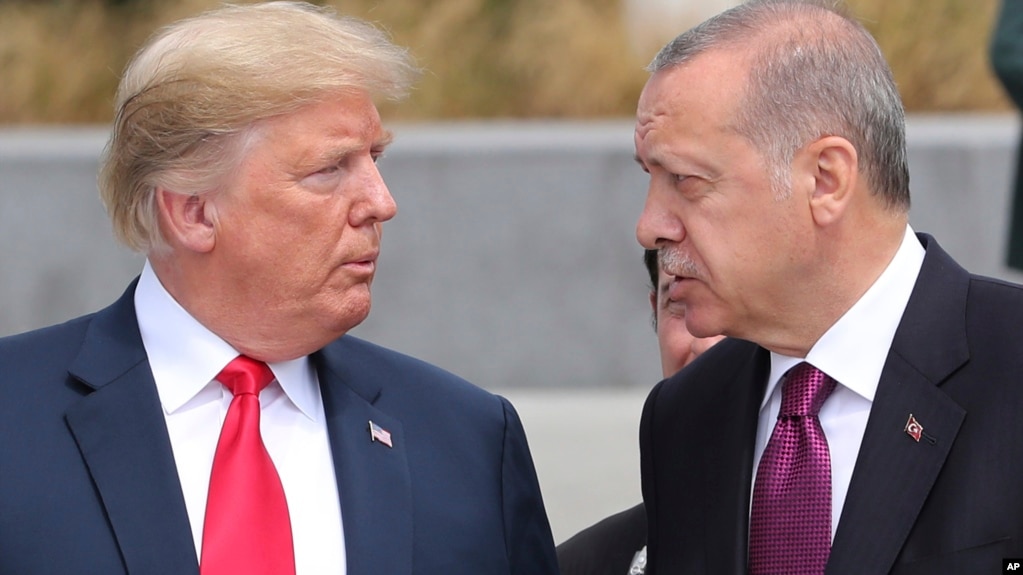Changing Horses in Midstream
"Turkey must choose — does it want to remain a critical partner in the most successful military alliance in history?"
"Or does it want to risk the security of that partnership by making such reckless decisions that will undermine our alliance?"
David Satterfield, U.S. nominee ambassador to Turkey
"The Americans are confused. What we hear from the American Pentagon, the State Department, is it [the S-400 sale] will create troubles and reduce trust and cause sanctions. But the American president has said nothing."
"If [U.S. President Donald] Trump says don't buy [the S-400 missiles] it will carry much more political weight. However, as long as there is no statement from the American president, there will probably be no return from this deal."
"I was speaking to American diplomats. I told them, 'It's America's choice — do they want to hit Turkey with sanctions that will make an unstable Turkey, that will destabilize the rest of the region'?"
Huseyin Bagci, international relations professor, Middle East Technical University, Ankara
"It's like a slow-motion car crash."
"It's even difficult now to call Turkey and the U.S. allies, so I am not very optimistic about the relationship."
Former senior Washington-Turkish diplomat Aydin Selcen
 |
| President Donald Trump, left, talks to Turkish President Recep Tayyip Erdogan, right, as they tour the new NATO headquarters in Brussels, Belgium, July 11, 2018. |
The simple fact being that the technology of the two systems, the Russian S-400s and the F-35 will 'bleed' into each other with the Russians gaining invaluable insight into the capabilities in the underlying technology of the F-35s, and the U.S. feels, not without reason, that its advanced technologies must be shielded from Russia's advantaging themselves of what is the property of the U.S.
Therefore, delivery of Turkish-manufactured F-35 parts has been halted for the U.S. will not accept them.
The American military leaders have themselves urged the U.S. executive administration that the decision to sell the advanced fighter to Turkey must be cancelled. Other NATO nations also feel uneasy about Turkey's controversial decisions interpreting its position as a deliberate snub of NATO in favour of warming relations with Russia. To the extent that Turkey's lack of commitment to the group bespeaks its greater interest in forging firmer ties with NATO's perceived enemy.

Turkey, once considered to be geographically important to NATO, was thought of as representing a "southern flank" to the Alliance, to bolster the northern shore of the Mediterranean, to contain the Soviet Union. Turkey's Incerlik Air Base on its southern shore, close to Syria, was another asset which remains for the time being a major U.S. and NATO base, holding hundreds of American tactical nuclear weapons.
But that was then, and this is now, and now Turkey is vastly different as a link between the Middle East and Europe, considered on the brink of Eastern Europe, a Muslim country of influence. At that time, a moderate democracy, Muslim-style, its free-enterprise system reflective of the West, a result of the post-Ottoman Empire, when Mustafa Kemal Ataturk turned it away from conservative Islam toward a simulacrum of a Western democracy, sharing Western values, with a free press and independent courts and representative government.
Turkey now is an Islamist nation, its Ataturk past slow dissolving back into its Ottoman Empire persona. Gone the free press and the independent judiciary in favour of full 'control' in the hands of Erdogan's Justice and Development Party headed by himself in perpetuity. Social repression, an ongoing war of attrition against its Kurdish population, now more accurately reflect Erdogan's new Turkey.
Recep Tayyip Erdogan is a firm supporter of the Muslim Brotherhood, violently disruptive group that came out of Egypt in the early 20th Century; the Salafist Islamist group supportive of jihad. As far as Erdogan is concerned, Hamas represents a responsible government in Gaza, and Israel is an aggressive tormentor of Palestinians. "Christian" Europe seeks to undermine Muslim authority and Erdogan will not have it; the Empire will rise again under his rule.
 |
| Turkish President Recep Tayyip Erdogan and Russian President Vladimir Putin attend a ceremony to mark the completion of the sea part of the TurkStream gas pipeline in Istanbul on 19 November (AFP) |
Labels: Alliance, Incompatibility, NATO, Russia, United States

<< Home